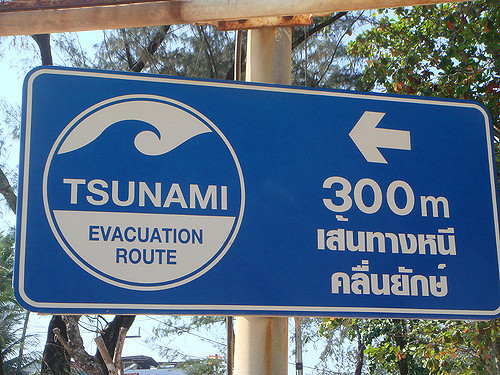
I live in a tsunami-prone country. That’s why, as a nine-year resident of Thailand, one of the Asian countries hit by the December, 2004 tsunami, whenever I visit a place in a tsunami-prone country that’s close to the ocean, I go prepared.
While, to some, it may seem a little bit like over-kill, when you’ve seen the damage a tsunami can cause, like I did in Phuket, Thailand only three weeks later, believe me if you’d seen it, you’d prepare too. In fact, for anyone considering a vacation in a country in a known tsunami zone, there are some things you should do. Just in case.
Know What a Tsunami Looks Like – Many of the thousands of tourists killed during the tsunami in Thailand drowned as they watched the ocean recede and come back in again. Not knowing what a tsunami looks like, in many cases, was the cause of their death. Make sure that never happens to you.
If you’ll be vacationing in a tsunami-prone country, before you leave learn what the warning signs of a tsunami are and how far inland or on higher ground is likely to be a ‘safe zone’.
Register With Your Embassy – If you’ll be spending any length of time (longer than 24 hours) in a tsunami-prone area of a foreign country, make sure you enroll or register with your embassy.
All that entails with many embassies is going to the embassy website of the country you’re in and signing up online. You tell them where you’ll be staying and for how long so if there is an emergency they know how to reach you if you need help.
I’m a citizen of two countries (the US and the UK) so, whenever I’m in a tsunami-prone country on vacation, I always register with embassies from both countries. After all, if one can’t help me, the other one probably can.
Think Carefully About The Hotel You Choose – Of course there’s no reason to be paranoid as tsunamis are such a rare event, and beach hotels are lovely. Still, if I travel down to Phuket, Thailand, one of the worst affected tsunami areas, I never book a beach hotel.
The hotel I stay at in Phuket is, coincidentally, perched up on a hill just a five minute walk from town. So, while I might not be in the thick of things, you can guarantee if a tsunami hits at 3am, I’ll be one of those not washed away.
If you think the same way I do, you can usually find out from the hotel you’re interested in how far they are from the beach and if they’re on an incline. Look at it this way – hotels not on the beach are usually cheaper as well.
Know What a Tsunami Warning Sounds Like – Many countries have tsunami warning systems in place and most of them sound completely different to each other.
Thailand installed its own tsunami warning system, which consists of loud sirens, only months after the 2004 tsunami that hit its shores. Japan, the victim of this week’s awful tsunami has tsunami warnings in any town that could even by remote chance be hit by a tsunami.
Make sure, when you arrive in a new country that may be tsunami-prone, ask at your hotel if there’s a tsunami warning in place and, if so, what it sounds like. Not paranoid. Just smart.
Watch TV on Vacation – Many people when they go on vacation use it as a time to avoid watching TV. Not always a smart move in a tsunami-prone country. In Thailand when the 2004 tsunami hit, the earthquake that caused it happened way out at sea, so there was no shaking of the earth as a precursor and a warning for the folks in Thailand, like the ones in Japan just had.
That’s why, if you’re on vacation in a tsunami-prone country, watch TV now and again. Any earthquake that may cause a tsunami in the region you’re staying in, will be on CNN, the BBC, or any other news channel and seeing it may just give you time to get out of there.
Don’t Listen To Others – If you experience an earthquake and you’re close to a coastal area, don’t listen to those who might try to minimize the situation. Sure, you may appear a little over-reactionary if you immediately get up, leave the area, get in your car and drive away, but I’d rather be over-reactionary than dead.
After all, you are only responsible for yourself and your loved ones. If others don’t want to leave a potential tsunami area, that’s their funeral not yours. And it very well could be.
If Evacuated, Leave Quickly – Some people still think their possessions are more important than their lives. If, by chance, you’re in a tsunami-prone country and evacuated from a potential tsunami, grab only the necessities and leave the area quickly. Whatever you’re trying to drag with you really isn’t as important as your life. It’s just stuff, and it can be replaced.
Use Common Sense – Don’t get freaked out by the littlest things and live in fear and paranoia, as you’ve a miniscule chance of ever being caught up in a tsunami on vacation.
However, just be aware of what’s going on around you and use some common sense. If you experience an earthquake or sense there’s something possibly terrible going to happen, there very well might be. Don’t ignore the feeling. Your life is worth more.
